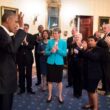Do the Numbers—While New York Times polling had 65 percent of the American public supporting a public option—a public health insurance company that would compete with private insurers—two amendments that would have provided a public option were rejected by the Senate Finance Committee. The defeat of Sen. John J. Rockefeller IV’s (D-WV) amendment (15-8) at a September 29 committee meeting was quickly followed by the defeat of Sen. Charles E. Schumer’s (D-NY) less-ambitious public option amendment (13-10).
How does a committee of 13 Democrats and 10 Republicans defeat two Democratic proposals that enjoy broad public support? There’s the Max Factor. Committee Chair Max Baucus (D-MT) spoke against both amendments, warning that he is determined report out a bill that will win 60 votes in the Senate. Baucus, as reported here before, received $3,544,835 in health care and insurance contributions over the course of his Senate career (according to Opensecrets.org).
Baucus is the industry’s favorite son, but he’s been in the Senate for 30 years. Arkansas Democrat Blanche Lincoln, one of three committee Democrats to vote “no” on both amendments, is the industry’s favorite daughter. She has received $2,126,191 from health care interests since she was elected to the Senate in 1998. Corporate opponents of reform recognize her weakness back home, where she trails all four potential Republican challengers (one of them by 47-to-39 percent) going into next year’s election. They have responded with their checkbooks.
Other Democratic committee members voting against the public option benefited from the largesse of health care and insurance donors. In 23 years in the Senate, North Dakota Senator Kent Conrad has accepted $1,364,853 from health care and insurance interests. Florida Democrat Bill Nelson, who voted against the Rockefeller amendment, has received $1,241,399 since he was elected in 2000. Delaware Senator Thomas Carper, who voted against the Rockefeller amendment, has received $869,034 since his election in 2000.
Politics isn’t entirely money driven. Other factors, such as Lincoln’s anemic poll numbers and Conrad’s legitimate concern about funding formulas and hospitals and doctors in North Dakota, are variables in the larger equation. But $9,146,312 buys a lot of love, and evidently trumps 65 percent of Americans who want a public option included in health care reform legislation.
Guns and Cars?—Republicans on the Senate Finance Committee are determined to obstruct anything that comes close to authentic health care reform. But they did provide some levity during the grinding six-hour debate of two public-option amendments they defeated (with the help of committee Democrats). Take Nevada’s John Ensign, who last seized the American public’s attention with his confession that he had an adulterous affair with a member of his staff—which he felt compelled to admit after his inamorata’s husband demanded a bribe and talked to the press. Back in his easy chair in the hearing room and impatient with facts and charts that demonstrated high mortality rates in the U.S. when compared to other countries, Ensign weighed in.
“Are you aware that if you take out the gun accidents and auto accidents, the United States actually is better than those other countries?” he said. “But that doesn’t have anything to do with health” he stammered. “I mean—we’re just a much more mobile society.… We drive our cars a lot more, they do public transportation…. And we love our guns.”
If the phlegmatic and humorless Charles Grassley of Iowa wasn’t laugh-out-loud funny, his head-full-of-ideas argument was laughable. “Well, you know, there are health economists around here, and I can only quote two, but I imagine there’s dozens you can quote. And the only reason I can quote two is because they’re the only ones that I want to keep in my head to give people answers,” said Grassley. “But one is, Heritage says that 83 million people are going to be forced out of their plan, employer plans, into public option, and Lewin Group says 120 million people.”
The Heritage Foundation, a right-wing think tank and foresworn opponent of health care reform, issued a report attacking Democratic reform proposals months before members of the 111th Congress took their oath of office. The Lewin Group is a “healthcare policy research and management consulting firm” that has been crunching numbers and publishing studies of health care in the U.S. for years. But it’s owned by United Health Care, a huge health-insurance combine whose CEO earned $124.8 million last year and is deeply invested in the health care reform fight.





0 Comments